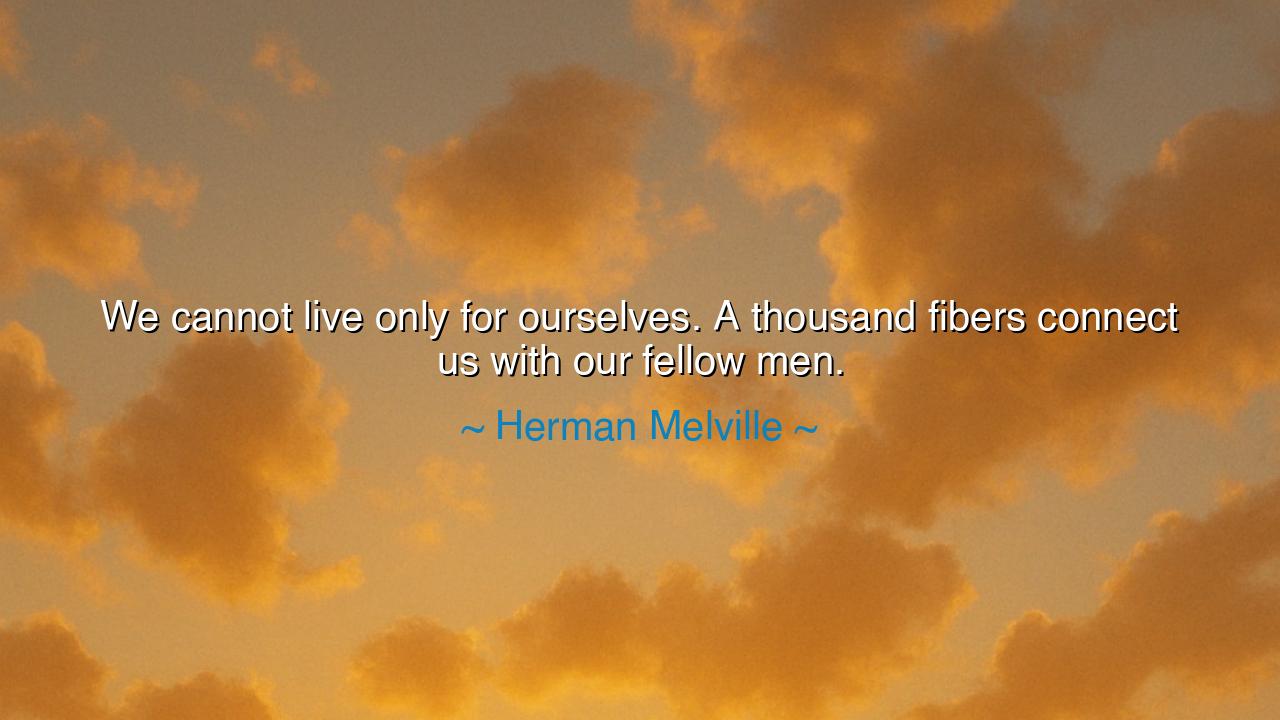
We cannot live only for ourselves. A thousand fibers connect us






Herman Melville, the great sailor of the soul and author of Moby-Dick, once wrote with profound truth: “We cannot live only for ourselves. A thousand fibers connect us with our fellow men.” In these words lies a vision of humanity not as a collection of isolated beings, but as a single living fabric—woven of invisible threads that bind heart to heart, life to life. Melville, who had seen both the solitude of the sea and the brotherhood of the ship, understood that interdependence is not weakness, but destiny. No man, however mighty, stands alone. Every joy we feel and every pain we cause sends ripples through the great web of existence that ties us all together.
The origin of this quote can be traced to Melville’s deep observation of life as a sailor and thinker. On the deck of a ship, each man’s survival depends upon the others: the ropes must be held, the sails raised, the watch kept through the long night. A single act of neglect could doom the whole vessel. From this truth of the sea, Melville drew a truth of the spirit—that society, too, is a ship upon vast waters, and we are its crew. When he speaks of “a thousand fibers,” he evokes the unseen threads of compassion, duty, and shared destiny that hold civilization together. To live “only for ourselves” is to cut those threads, to drift into the abyss of selfishness where humanity loses its course.
The ancients would have recognized Melville’s wisdom as a reflection of their own. The philosopher Marcus Aurelius wrote, “What is not good for the hive is not good for the bee.” The Greek tragedians taught that the ruin of one man often begins in the arrogance of believing himself apart from the whole. Likewise, in the teachings of the East, the sage sees every being as a wave of one ocean—distinct in form, but not in essence. Melville’s metaphor of the “fibers” carries this same eternal message: connection is the law of life. To deny it is to rebel against the order of creation itself.
History provides luminous proof of this truth. In the years of the Second World War, nations discovered that survival required unity, sacrifice, and shared purpose. On the battlefield and at home, people learned again that the well-being of one depended on the courage of another. A soldier’s life might hang on the medic’s hands, and a mother’s hope depended on the unseen workers forging tools of defense. In those dark years, the fibers that bound humanity were tested—and, in many, they held. It was not the strength of armies alone that triumphed, but the invisible power of cooperation, empathy, and faith in one another.
Melville’s words also reveal a moral calling. He reminds us that to live meaningfully, we must recognize our responsibility for one another. Every act of kindness strengthens the web; every act of cruelty tears it. When we speak harshly, the wound travels outward; when we act generously, the healing does too. To live “for ourselves” may bring fleeting satisfaction, but it leaves the soul impoverished, like a star cut off from the constellations it once illuminated. True fulfillment lies in recognizing that our existence gains purpose only when it contributes to the good of others.
There is both humility and glory in this teaching. Humility, because it reminds us that we are not the center of the universe; glory, because it shows that every small act matters. The hand that feeds the hungry, the word that comforts the grieving, the heart that forgives—all these are fibers that sustain the fabric of humanity. And though each may seem fragile, together they form something indestructible: the enduring unity of the human spirit.
So, my friends, let this truth be carried as a torch into every corner of life: you are bound to others, and others are bound to you. When you lift another, you rise with them; when you harm another, you wound yourself. Seek not the illusion of independence, for it is the solitude of the broken thread. Instead, live as a weaver of the human fabric—strengthening the bonds of compassion wherever you walk. For as Melville teaches, we are not meant to drift alone upon the waters of existence. The thousand fibers that bind us are the very cords of meaning, and through them, we find not only one another—but also ourselves.






AAdministratorAdministrator
Welcome, honored guests. Please leave a comment, we will respond soon